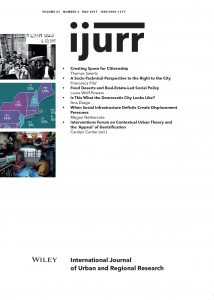Since the turn of the century, urban scholars have argued that cities are the sites par excellence where new political subjects are emerging and changing the face of citizenship. Undocumented activism is often invoked as an example of this phenomenon and an object of renewed interest. What remains unclear, however, is how these precarious actors, who are barred from institutional channels for voicing their grievances and who have little access to resources, become political. This article argues that the urban interstices—or the spaces in between legality and illegality, visibility and invisibility and formality and informality—offer strategic opportunities for undocumented activism. I introduce a theoretical understanding of liminal politics that focuses on the spatial and symbolic practices by means of which the undocumented, who find themselves betwixt and between statuses, develop innovative methods of political expression. Based on a multi-sited ethnography, I demonstrate that undocumented activists craft urban space as a ‘backstage’ as well as a ‘frontstage’ for their struggles over citizenship. On the one hand, undocumented immigrants build safe spaces in which they can (re)imagine their subjectivities and develop political scripts. On the other hand, they stage and enact these political scripts by appropriating public space. This study therefore highlights the spatiality, theatricality and performativity of emerging forms of urban citizenship.

